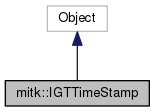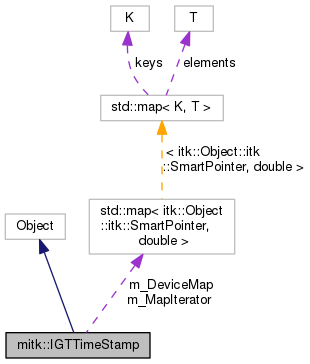|
Medical Imaging Interaction Toolkit
2016.11.0
Medical Imaging Interaction Toolkit
|
|
Medical Imaging Interaction Toolkit
2016.11.0
Medical Imaging Interaction Toolkit
|
Time stamp in milliseconds. More...
#include <mitkIGTTimeStamp.h>


Public Member Functions | |
| mitkClassMacroItkParent (IGTTimeStamp, itk::Object) | |
| void | Start (itk::Object::Pointer device) |
| starts the time-acquisition More... | |
| void | Stop (itk::Object::Pointer device) |
| stops the time-acqusition More... | |
| double | GetElapsed () |
| returns the time elapsed since calling Start() for the first time in milliseconds More... | |
| double | GetElapsed (itk::Object::Pointer device) |
| returns the time elapsed since 'device' called Start() in milliseconds More... | |
| double | GetOffset (itk::Object::Pointer Device) |
| returns the offset of this device's starting-time to the reference-time in ms More... | |
| void | SetRealTimeClock (mitk::RealTimeClock::Pointer Clock) |
| setter for the internally used RealTimeClock() More... | |
| void | Initialize () |
| creates a new RealTimeClock More... | |
Static Public Member Functions | |
| static IGTTimeStamp * | CreateInstance () |
| creates a new instance of mitkTimeStamp More... | |
| static IGTTimeStamp * | GetInstance () |
| returns a pointer to the current instance of mitkTimeStamp More... | |
Protected Member Functions | |
| IGTTimeStamp () | |
| virtual | ~IGTTimeStamp () |
| double | GetCurrentStamp () |
Protected Attributes | |
| double | m_Time |
| double | m_ReferenceTime |
| mitk::RealTimeClock::Pointer | m_RealTimeClock |
| std::map< itk::Object::Pointer, double > | m_DeviceMap |
| std::map< itk::Object::Pointer, double >::iterator | m_MapIterator |
Static Protected Attributes | |
| static mitk::IGTTimeStamp::Pointer | s_Instance |
Time stamp in milliseconds.
This class provides a timestamp in milliseconds. It is a Singleton class, that internally uses a mitkRealTimeClock() for time-acquisition.
First you have to call Start() in order to set the reference-time to the current time. If the user has not created and set his own "RealTimeClock", initialize() will be called and a default mitkRealTimeClock() is created. In addition the TimeStamp() saves a pointer to the device calling and the respective offset-time. The first device will have an offset of 0, the following's offset will be the time elapsed since the starting of the first device. This offset can be prompted by calling GetOffset();
You can always get the time elapsed since calling Start() with GetElapsed(). It returns the time spent in milliseconds as a double.
When the TimeStamp is no longer used, you can call Stop(). This erases the pointer to the device and the offset. When all devices have "stopped tracking" the reference-time and the current-time are reset to 0.
Definition at line 52 of file mitkIGTTimeStamp.h.
|
protected |
Definition at line 24 of file mitkIGTTimeStamp.cpp.
|
protectedvirtual |
Definition at line 29 of file mitkIGTTimeStamp.cpp.
|
static |
creates a new instance of mitkTimeStamp
This method returns a pointer to the currently existing TimeStamp. If there is no exisiting instance, a new one is created and returned automatically
DECREPATED: Use GetInstance instead
Definition at line 33 of file mitkIGTTimeStamp.cpp.
References GetInstance().
|
protected |
Definition at line 125 of file mitkIGTTimeStamp.cpp.
| double mitk::IGTTimeStamp::GetElapsed | ( | ) |
returns the time elapsed since calling Start() for the first time in milliseconds
GetElapsed() returns the time elapsed since Start() has been called first, no matter which itk::Object did the call. This method-call can be used if you want to need to have several processes you want to monitor and need timestamps in the same space of time, e.g. when using two tracking-devices on the same experiment.
Definition at line 100 of file mitkIGTTimeStamp.cpp.
Referenced by mitk::NavigationDataPlayer::GenerateData(), mitk::NavigationDataRecorder::GenerateData(), mitk::TrackingDeviceSource::GenerateData(), mitk::NavigationDataPlayer::Pause(), mitk::NavigationDataPlayer::Resume(), mitk::NavigationDataPlayer::StartPlaying(), and mitk::NavigationDataRecorderDeprecated::Update().
| double mitk::IGTTimeStamp::GetElapsed | ( | itk::Object::Pointer | device | ) |
returns the time elapsed since 'device' called Start() in milliseconds
GetElapsed(itk::Object device) returns the time elapsed since the given itk::Object called Start(). This overloaded method should be used when you only have one independent process to keep track of, e.g. when you want to measure how long it takes to execute a piece of code.
Definition at line 111 of file mitkIGTTimeStamp.cpp.
References offset.
|
static |
returns a pointer to the current instance of mitkTimeStamp
This method returns a pointer to the currently existing TimeStamp. If there is no exisiting instance, a new one is created and returned automatically
Definition at line 38 of file mitkIGTTimeStamp.cpp.
References s_Instance.
Referenced by CreateInstance(), mitk::NavigationDataPlayer::GenerateData(), mitk::NavigationDataRecorder::GenerateData(), mitk::TrackingDeviceSource::GenerateData(), mitk::NavigationDataPlayer::NavigationDataPlayer(), mitk::NavigationDataRecorderDeprecated::NavigationDataRecorderDeprecated(), mitk::NavigationDataPlayer::Pause(), mitk::NavigationDataRecorder::ResetRecording(), mitk::NavigationDataPlayer::Resume(), mitk::NavigationDataPlayer::StartPlaying(), mitk::NavigationDataRecorder::StartRecording(), mitk::ClaronTrackingDevice::StartTracking(), mitk::VirtualTrackingDevice::StartTracking(), mitk::NDITrackingDevice::StartTracking(), mitk::VirtualTrackingDevice::StopTracking(), mitk::TrackingDevice::StopTracking(), mitk::ClaronTrackingDevice::TrackTools(), and mitk::NavigationDataRecorderDeprecated::Update().
| double mitk::IGTTimeStamp::GetOffset | ( | itk::Object::Pointer | Device | ) |
returns the offset of this device's starting-time to the reference-time in ms
Device 'A' is the first device to call Start(). Device 'B' calls Start() some time later. This time-difference is the offset, that each device has realtive to the device that started the time-acquisition. Each device's offset is stored in a map with a pointer to the device.
If this device has not been or is no longer saved in the map of devices, -1 will be returned.
only used internally
Definition at line 139 of file mitkIGTTimeStamp.cpp.
| void mitk::IGTTimeStamp::Initialize | ( | ) |
creates a new RealTimeClock
Instanciates a new RealTimeClock, that will be specific for the Operating System. This will only be called internally when no other RealTimeClock has been set by the user.
Definition at line 152 of file mitkIGTTimeStamp.cpp.
References mitk::RealTimeClock::New().
| mitk::IGTTimeStamp::mitkClassMacroItkParent | ( | IGTTimeStamp | , |
| itk::Object | |||
| ) |
| void mitk::IGTTimeStamp::SetRealTimeClock | ( | mitk::RealTimeClock::Pointer | Clock | ) |
setter for the internally used RealTimeClock()
If you want to use a "third-party" RealTimeClock, e.g PocoRealTimeClock, BoostRealTimeClock or ITKRealTimeClock, you can set it using this method: mitk::<bla>RealTimeClock::Pointer RealTimeClock = mitk::<bla>RealTimeClock::New(); mitk::TimeStamp::GetInstance()->SetRealTimeClock(RealTimeClock);
Right now, none of these RealTimeClocks have been implemented!!
Notice: The mitk-implementation of an os-dependant RealTimeClock is used by default.
Definition at line 134 of file mitkIGTTimeStamp.cpp.
| void mitk::IGTTimeStamp::Start | ( | itk::Object::Pointer | device | ) |
starts the time-acquisition
Each device is to call this method when it starts tracking. The current time is saved as a reference-value (m_Time = 0). Internally the device (pointer) and its offset are saved in a map, so that no device can call this method twice. If the user has not set its own RealTimeClock, a default one is created dependant on the OS in use.
Definition at line 50 of file mitkIGTTimeStamp.cpp.
Referenced by mitk::NavigationDataPlayer::NavigationDataPlayer(), mitk::NavigationDataRecorderDeprecated::NavigationDataRecorderDeprecated(), mitk::NavigationDataRecorder::ResetRecording(), mitk::NavigationDataRecorder::StartRecording(), mitk::ClaronTrackingDevice::StartTracking(), mitk::VirtualTrackingDevice::StartTracking(), and mitk::NDITrackingDevice::StartTracking().
| void mitk::IGTTimeStamp::Stop | ( | itk::Object::Pointer | device | ) |
stops the time-acqusition
Each device has to call Stop() when it has finished and its pointer will be erased from the map. When the last device has "stopped" the reference-time and the current-time will be reset to 0.
Definition at line 74 of file mitkIGTTimeStamp.cpp.
Referenced by mitk::NavigationDataRecorder::ResetRecording(), mitk::VirtualTrackingDevice::StopTracking(), and mitk::TrackingDevice::StopTracking().
|
protected |
Definition at line 184 of file mitkIGTTimeStamp.h.
|
protected |
Definition at line 186 of file mitkIGTTimeStamp.h.
|
protected |
Definition at line 178 of file mitkIGTTimeStamp.h.
|
protected |
Definition at line 175 of file mitkIGTTimeStamp.h.
|
protected |
Definition at line 172 of file mitkIGTTimeStamp.h.
|
staticprotected |
Definition at line 181 of file mitkIGTTimeStamp.h.
Referenced by GetInstance().